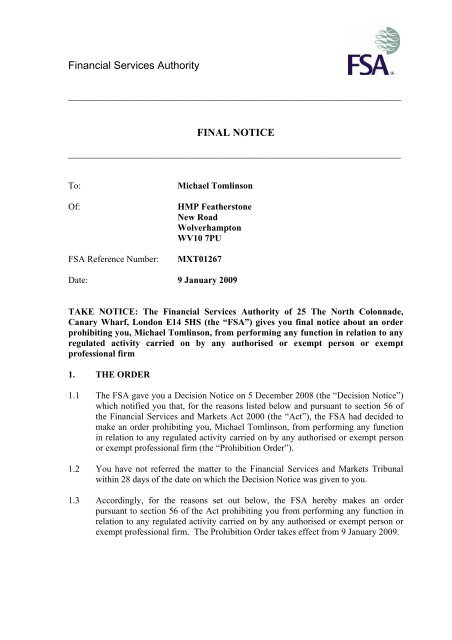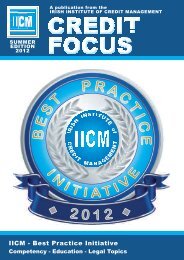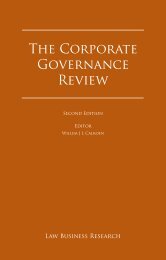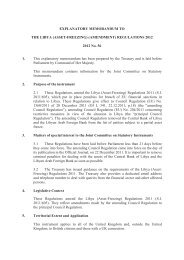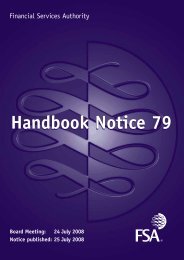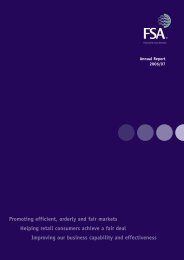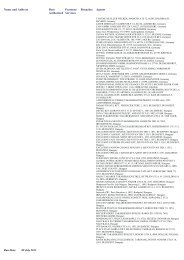Financial Services Authority FINAL NOTICE
Final Notice: Michael Tomlinson - Better Regulation Ltd
Final Notice: Michael Tomlinson - Better Regulation Ltd
Create successful ePaper yourself
Turn your PDF publications into a flip-book with our unique Google optimized e-Paper software.
<strong>Financial</strong> <strong>Services</strong> <strong>Authority</strong><br />
_________________________________________________________________________<br />
<strong>FINAL</strong> <strong>NOTICE</strong><br />
_________________________________________________________________________<br />
To:<br />
Of:<br />
FSA Reference Number:<br />
Michael Tomlinson<br />
HMP Featherstone<br />
New Road<br />
Wolverhampton<br />
WV10 7PU<br />
MXT01267<br />
Date: 9 January 2009<br />
TAKE <strong>NOTICE</strong>: The <strong>Financial</strong> <strong>Services</strong> <strong>Authority</strong> of 25 The North Colonnade,<br />
Canary Wharf, London E14 5HS (the “FSA”) gives you final notice about an order<br />
prohibiting you, Michael Tomlinson, from performing any function in relation to any<br />
regulated activity carried on by any authorised or exempt person or exempt<br />
professional firm<br />
1. THE ORDER<br />
1.1 The FSA gave you a Decision Notice on 5 December 2008 (the “Decision Notice”)<br />
which notified you that, for the reasons listed below and pursuant to section 56 of<br />
the <strong>Financial</strong> <strong>Services</strong> and Markets Act 2000 (the “Act”), the FSA had decided to<br />
make an order prohibiting you, Michael Tomlinson, from performing any function<br />
in relation to any regulated activity carried on by any authorised or exempt person<br />
or exempt professional firm (the “Prohibition Order”).<br />
1.2 You have not referred the matter to the <strong>Financial</strong> <strong>Services</strong> and Markets Tribunal<br />
within 28 days of the date on which the Decision Notice was given to you.<br />
1.3 Accordingly, for the reasons set out below, the FSA hereby makes an order<br />
pursuant to section 56 of the Act prohibiting you from performing any function in<br />
relation to any regulated activity carried on by any authorised or exempt person or<br />
exempt professional firm. The Prohibition Order takes effect from 9 January 2009.
2. REASONS FOR THE ORDER<br />
Introduction<br />
2.1 The FSA has concluded, on the basis of the facts and matters and conclusions<br />
described in its Warning Notice dated 29 October 2008 (an extract from which is<br />
attached to and forms part of this Final Notice), and in the Decision Notice, that you<br />
are not a fit and proper person to perform any functions as your conduct<br />
demonstrated a lack of honesty and integrity. Specifically, on 30 June 2008, you<br />
were convicted of 22 counts of financial crime offences.<br />
Relevant Statutory Provisions<br />
2.2 The FSA’s statutory objectives are set out in section 2(2) of the Act and include the<br />
protection of consumers and the reduction of financial crime.<br />
2.3 The FSA’s power to make a prohibition order is set out in section 56 of the Act and<br />
the procedure to be followed is set out in section 58 of the Act.<br />
Relevant Guidance<br />
The Enforcement Guide (“EG”)<br />
2.4 The FSA’s policy in relation to exercising its power to issue a prohibition order is<br />
set out in EG.<br />
2.5 EG 9.1 explains the purpose of prohibition orders in relation to the FSA’s<br />
regulatory objectives.<br />
2.6 EG 9.3 to 9.5 set out the FSA’s policy on making prohibition orders. In particular:<br />
(a)<br />
(b)<br />
(c)<br />
EG 9.3 states that the FSA will consider all relevant circumstances,<br />
including whether enforcement action has been taken against the individual<br />
by other enforcement agencies, in deciding whether to make a prohibition<br />
order;<br />
EG 9.4 states that the FSA has power to make a range of prohibition orders:<br />
they may be unlimited or they may be limited to specific functions in<br />
relation to specific regulated activities, depending on the reasons why the<br />
individual is not fit and proper and the severity of risk he poses to consumers<br />
or the market generally, and<br />
EG 9.5 states that the scope of a prohibition order will depend on the reasons<br />
why the individual is not fit and proper and the severity of risk he poses to<br />
consumers or the market generally.<br />
2.7 EG 9.17 sets out that where the FSA is considering whether to make a prohibition<br />
order against someone who is not an approved person, the FSA will consider the<br />
severity of the risk posed by the individual and may prohibit him where it considers<br />
that it is necessary to achieve the FSA’s regulatory objectives.
2.8 EG 9.18 states that, when determining the fitness and propriety of such an<br />
individual, the FSA will consider a number of factors, including those set out in EG<br />
9.9. These factors include: the criteria for assessing the fitness and propriety of<br />
approved persons set out in the Fit and Proper Test for Approved Persons (“FIT”)<br />
section of the FSA Handbook; the Statements of Principles and Code of Practice for<br />
Approved Persons (“APER”), the relevance and materiality of any matters<br />
indicating unfitness, and the severity of the risk which the individual poses to<br />
consumers and to confidence in the financial system.<br />
Statements of Principles and Code of Practice for Approved Persons<br />
2.9 Statement of Principle 1 states that an approved person must act with integrity in<br />
carrying out his controlled function.<br />
2.10 APER 4.1 sets out the conduct which does not comply with Statement of Principle<br />
1. In particular, this includes providing false or inaccurate documentation or<br />
information (APER 4.1.4E(9)), misappropriating a client’s assets, including<br />
wrongly transferring to personal accounts cash belonging to clients (APER<br />
4.1.11E(3)) and using a client’s funds for purposes other than those for which they<br />
were provided (APER 4.1.11E(5)).<br />
Fit and Proper Test for Approved Persons<br />
2.11 The FSA has issued guidance on the fitness and propriety of individuals in FIT.<br />
2.12 FIT 1.1.2G states that the purpose of FIT is to set out and describe the criteria that<br />
the FSA will consider when assessing the fitness and propriety of a candidate for a<br />
controlled function. The criteria are also relevant in assessing the continuing fitness<br />
and propriety of approved persons.<br />
2.13 FIT 1.3.1G(1) states that the most important consideration includes a person’s<br />
honesty, integrity and reputation.<br />
2.14 FIT 2.1 gives specific guidance in determining a person’s honesty, integrity and<br />
reputation. In particular:<br />
(a)<br />
(b)<br />
FIT 2.1.3G(1) states that the FSA will have regard to whether a person has<br />
been convicted of any criminal offence, and goes on to say that particular<br />
consideration will be given to offences of dishonesty, fraud, financial crime<br />
or other offences under legislation relating to companies, banking and<br />
financial services, insolvency and consumer protection; and<br />
FIT 2.1.3G(12) states the FSA will have regard to whether the person has<br />
ever been disqualified from acting as a director or disqualified from acting in<br />
any managerial capacity.
3. DECISION MAKER<br />
3.1 The decision which gave rise to the obligation to give this Final Notice was made<br />
by the Regulatory Decisions Committee.<br />
4. IMPORTANT<br />
4.1 This Final Notice is given to you in accordance with section 390(1) of the Act.<br />
Publicity<br />
4.2 Sections 391(4), 391(6) and 391(7) of the Act apply to the publication of<br />
information about the matter to which this Final Notice relates. Under those<br />
provisions, the FSA must publish such information about the matter to which this<br />
Final Notice relates as the FSA considers appropriate. The information may be<br />
published in such manner as the FSA considers appropriate. However, the FSA<br />
may not publish information if such publication would, in the opinion of the FSA,<br />
be unfair to you or prejudicial to the interests of consumers.<br />
4.3 The FSA intends to publish such information about the matter to which this Final<br />
Notice relates as it considers appropriate.<br />
FSA contact<br />
4.4 For more information concerning this matter generally, you should contact Pauline<br />
Cheng (direct line: 020 7066 5228 / fax: 020 7066 5229) of the Enforcement<br />
Division of the FSA.<br />
………………………………..<br />
John Kirby<br />
FSA Enforcement Division
EXTRACT FROM THE WARNING <strong>NOTICE</strong> DATED 29 OCTOBER 2008 ISSUED<br />
TO MICHAEL TOMLINSON<br />
“2. REASONS FOR PROPOSED ACTION<br />
Facts and matters relied on<br />
2.16. You were a director of Acorn Holdings Limited (“Acorn”). Acorn was authorised<br />
by the FSA on 4 April 2002 and you became an FSA approved person on 9 April<br />
2002. Acorn’s authorisation was cancelled on 22 December 2005. On the same<br />
date you ceased to be an approved person.<br />
2.17. On 26 September 2007, under section 1A of the Company Directors<br />
Disqualification Act 1986, you were disqualified from acting as a director for a<br />
period of 11 years. You were disqualified for unfitness to act as a company<br />
director.<br />
2.18. On 30 June 2008, you were convicted at Shrewsbury Crown Court of one count of<br />
trading with intent to defraud creditors and 21 counts of obtaining a money transfer<br />
by deception. You committed these offences whilst you were employed in various<br />
positions within the financial services industry, including throughout the period that<br />
you were an approved person with Acorn.<br />
2.19. On 28 July 2008, you were sentenced to six years and eight months imprisonment at<br />
Shrewsbury Crown Court. Under section 79(2)(a) of the Powers of Criminal Court<br />
(Sentencing) Act 2000, the Court may only pass a custodial sentence where the<br />
offence is so serious that such a sentence can be justified by the offence.<br />
Conclusions<br />
2.20. The facts and matters described above lead the FSA, having regard to its regulatory<br />
objectives which include the protection of consumers and the prevention of<br />
financial crime, to the following conclusions:<br />
• you have acted dishonestly and without integrity by misappropriating client<br />
money whilst acting as an approved person of an authorised firm in breach<br />
of Statement of Principle 1;<br />
• you have been convicted of the criminal offences of trading with intent to<br />
defraud creditors and obtaining money transfers by deception, offences of<br />
such seriousness as to justify a custodial sentence;<br />
• the convictions, and the conduct which gave rise to them, go directly to<br />
impugn your honesty, integrity and reputation and therefore demonstrate<br />
that you are not a fit and proper person to perform any function in relation to<br />
any regulated activity carried on by any authorised or exempt person or<br />
exempt professional firm;
• you present a risk to consumers as well as to the FSA’s statutory objective<br />
of the reduction of financial crime as you have failed to demonstrate that<br />
you conduct your business in compliance with proper standards; and<br />
• the severity of the risk that you pose to consumers and to confidence in the<br />
market generally is such that it is necessary in order to achieve its regulatory<br />
objectives for the FSA to make a prohibition order against you in the terms<br />
proposed.”<br />
END OF EXTRACT


